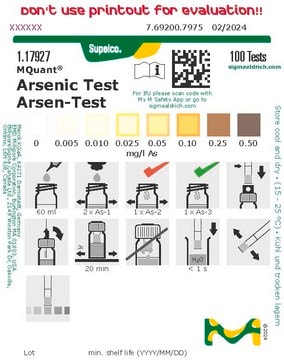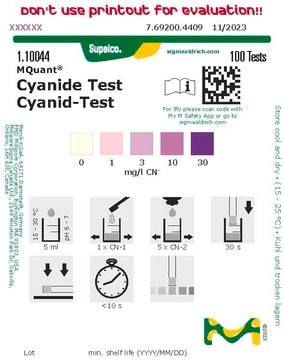1.17917
Arsenic Test Strips, colorimetric
0.02-3 mg/L (As), MQuant®
Szinonimák:
Arsenic chemical test strips
About This Item
Javasolt termékek
product name
Arsenic Test, colorimetric, As 0.02-3 mg/L, MQuant®
leírás
semi-quantitative
Minőségi szint
termékcsalád
MQuant®
specifikus analit(ok)
arsenic
reakcióalkalmasság
reaction type: modified Gutzeit test
As measuring range
0.02-3 mg/L
észlelési módszer
colorimetric
tárolási hőmérséklet
15-25°C
Általános leírás
The arsenic test strips are suitable for measuring arsenic in water, pharmaceutical products, prepared biological specimens and liquid foods. Within this MQuant® Arsenic test, test strips are used in combination with additional reagents. Arsenic is liberated from the sample by adding zinc powder, a solid acid, and - for the elimination of interfering sulfide ions - an oxidizing agent. On the reaction zone of the test strip a yellow-brown dye is formed. The concentration of arsenic(III) and arsenic(V) are measured semi-quantitatively by visual comparison of the reaction zone of the test strip with the fields of a color scale. The test strips are perfect for pre-testing a sample in an economic and quick way to estimate the arsenic concentration and a possible dilution factor prior to using a quantitative method such as our Spectroquant® test.
Alkalmazás
- Arsenic Pigments in Libraries – Testing Methods, Contaminated Spaces, and Occupational Safety Measures: In a research project, the Bonn University and State Library and the Cologne University of Applied Sciences analyzed the handling of arsenic in library materials. Arsenic-containing pigments in library materials are a source of danger for institutional staff, conservators, scientists, and users. Over 300 volumes with suspicious green book components were analyzed using both XRF and Raman spectroscopy, with arsenic compounds being detected in around half of them. The XRF device is mobile and effective, it yields reproducible data and can detect a multitude of elements such as arsenic, lead, and mercury. However, it emits radiation and is limited to small spots. Special training for operating the device as well as for interpreting the results is needed. A rapid test based on bromide test strips and the [TM=“MQUANT”] test kit were then evaluated. When comparing the rapid test kits, the [TM=“MQUANT”] test kit appears to be more suitable than the bromide test paper as it includes all necessary accessories and helps minimize the hazard potential for users. The [TM=“MQUANT”] test kit may be suitable for initial in situ examinations, after training and instruction of the archive staff, being fairly accurate, ready-made, easy to handle, and suitable for testing surfaces. (Wetten J et al., 2024)
- Improved On-Site Characterization of Arsenic in Gypsum from Waste Plasterboards Using Smart Devices.: The research highlights the development of smart device-based arsenic tests for on-site characterization of arsenic in gypsum, enhancing the efficiency and accuracy of environmental monitoring and waste management (Tafu M et al., 2022).
- MnFe(2)O(4) micromotors enhanced field digestion and solid phase extraction for on-site determination of arsenic in rice and water.: This study employs arsenic tests in conjunction with MnFe(2)O(4) micromotors for on-site arsenic determination in rice and water samples, showcasing advancements in sample preparation and field analysis techniques (Luo Y et al., 2021).
- Impact of receipt of private well arsenic test results on maternal use of contaminated drinking water in a U.S. population.: The research evaluates the behavioral impact of receiving arsenic test results on maternal use of contaminated drinking water, emphasizing the importance of arsenic testing in public health interventions (He X et al., 2018).
- Test for arsenic speciation in waters based on a paper-based analytical device with scanometric detection.: This study presents a novel paper-based analytical device for arsenic speciation in water, utilizing scanometric detection to offer a cost-effective and portable solution for environmental monitoring (Pena-Pereira F et al., 2018).
Jogi információk
Nem találja a megfelelő terméket?
Próbálja ki a Termékválasztó eszköz. eszközt
Figyelmeztetés
Warning
Figyelmeztető mondatok
Óvintézkedésre vonatkozó mondatok
Veszélyességi osztályok
Aquatic Acute 1 - Aquatic Chronic 1 - Eye Irrit. 2 - Skin Irrit. 2
Tárolási osztály kódja
11 - Combustible Solids
WGK
WGK 2
Analitikai tanúsítványok (COA)
Analitikai tanúsítványok (COA) keresése a termék sarzs-/tételszámának megadásával. A sarzs- és tételszámok a termék címkéjén találhatók, a „Lot” vagy „Batch” szavak után.
Már rendelkezik ezzel a termékkel?
Az Ön által nemrégiben megvásárolt termékekre vonatkozó dokumentumokat a Dokumentumtárban találja.
Tudóscsoportunk valamennyi kutatási területen rendelkezik tapasztalattal, beleértve az élettudományt, az anyagtudományt, a kémiai szintézist, a kromatográfiát, az analitikát és még sok más területet.
Lépjen kapcsolatba a szaktanácsadással








